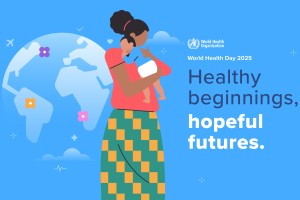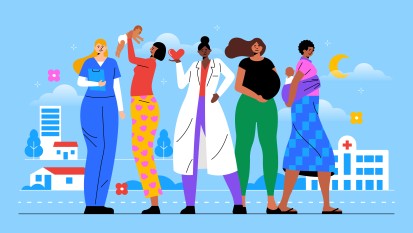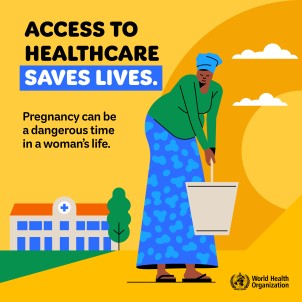
World Health Day puts spotlight on women’s health and wellbeing
World Health Day, to be celebrated on 7 April 2025, will launch a year-long campaign on maternal and newborn  health.
health.
The campaign, titled Healthy beginnings, hopeful futures, will urge governments and the health community to ramp up efforts to end preventable maternal and newborn deaths, and to prioritize women’s longer-term health and wellbeing.
This task is critical!
According to the World Health Organization (WHO), based on currently published estimates, close to 300 000 women lose their life due to pregnancy or childbirth each year, while over 2 million babies die in their first month of life and around 2 million more are stillborn. That’s roughly one preventable death every seven seconds.
Based on current trends, a staggering four out of five countries are off track to meet targets for improving maternal survival by 2030. One in three will fail to meet targets for reducing newborn deaths.
According to the 16th annual Perinatal and Maternal Mortality Review Committee (PMMRC) report released last year, in Aotearoa New Zealand there had been no significant decrease in perinatal mortality over the years of 2007-2021.
The report found that ethnicity, deprivation and age inequities persisted across perinatal and maternal mortality. Although there was a decrease in maternal mortality rates from 2006 - 2012, Māori and Pacific peoples had over twice the rate of maternal mortality compared to the group with the lowest rate (European). If the Māori and Pacific mortality rates were the same as the European rates, overall maternal mortality in Aotearoa New Zealand would be 30 per cent lower.
The Public Health Communications Centre Aotearoa’s Briefing has an excellent article titled Aotearoa’s perinatal and maternal death rates remain inequitable and unjust which you can read HERE.
Why this campaign is so crucial
HPF’s Executive Director Sione Tu’itahi said women's health is everyone's health because half of our world's population are women.
“They are the first teacher and caregiver to every generation across the world,” said Sione.
“But in every crisis, such as the polycrisis of geo-political wars, failing economic systems and environmental catastrophes, that we are facing today, the most vulnerable are the ones who suffer the most - women and children.
"This is why health promotion focuses on addressing the social and ecological determinants of health."
Dr Anshu Banerjee, Director of Maternal, Newborn, Child and Adolescent Health and Ageing at WHO said the focus of  this campaign comes at a crucial moment, aiming to help countries regain lost progress while showcasing new research and evidence that will enhance the health of women and babies globally, said
this campaign comes at a crucial moment, aiming to help countries regain lost progress while showcasing new research and evidence that will enhance the health of women and babies globally, said
“As rollbacks to humanitarian assistance jeopardize a critical lifeline for millions, it will also be an opportunity to step up support and collaboration for global health - and deliver hope to those in urgent need of lifesaving care.”
The campaign will also urge increased global attention to women’s longer-term health and well-being. This includes advocating for laws and policies that safeguard their health and rights, such as paid maternity leave and other critical employment protections, and access to vital family planning services.
Making this World Health Day campaign even more significant is that 2025 marks the 30th anniversary of the Beijing Declaration and Platform for Action, the world’s most comprehensive, visionary plan ever created to achieve the equal rights of ALL women and girls.
Agreed on by 189 governments in 1995, at the Fourth World Conference on Women, the Platform centres on 12 areas of action – referred to as “critical areas of concern”. These cover health, jobs and the economy, political participation, peace, the environment, ending violence against women and more. Every five years, countries review who is doing what and where – or not.
A review and appraisal of the implementation of the Declaration and the Platform for Action was the main focus of the 69th Session of the Commission on the Status of Women (CSW69), also known as ‘Beijing Plus-30,’ held in the US last month.
An investment, not a cost
According to WHO in low- and middle-income countries, every US$1 invested in maternal and newborn health is estimated to yield around US$9 to 20 in return. Evidence shows that spending on maternal and newborn health leads to economic development and happier, healthier societies.
Health systems must evolve to manage the many health issues that impact maternal and newborn health. These not only include direct obstetric complications but also mental health conditions, noncommunicable diseases and family planning.
Additionally, women and families should be supported by laws and policies that safeguard their health and rights.
World Health Day 2025 is a call to action for everyone, everywhere. It's an opportunity to unify efforts to improve health outcomes and achieve health equity across the globe. By participating in World Health Day, we contribute to a global movement towards a healthier, more equitable world for future generations.
Campaign goals
• To raise awareness about gaps in maternal and newborn survival and the need to prioritize women’s longer-term wellbeing.
• To advocate for effective investments that improve the health of women and babies.
• To encourage collective action to support parents as well as health professionals who provide critical care.
• To provide useful health information relating to pregnancy, childbirth, and the postnatal period.
How you can get involved
• Here’s what you can do to support the campaign:• Spread awareness: share information about the campaign using #HopefulFutures and #HealthForAll.
• Participate: attend WHO’s global events to learn more about what it will take to end maternal and newborn mortality.
• Donate: contribute to the WHO Foundation which supports WHO’s work to protect mothers and babies in countries around the world.
• Share your lived experiences: share your own experiences or stories of pregnancy and birth and thank those who provide quality care.